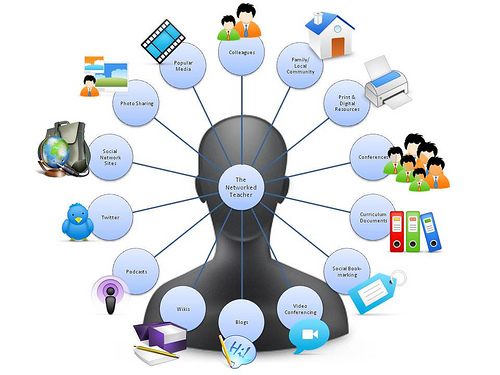Your Personal Learning Network, Environment and Operating System
 I didn't get to attend a workshop on personal learning networks (PLNs) led by Helen Blunden in Ghent, Belgium at Learning Tech Day. I would have loved to travel to Belgium, but thankfully, someone who did attend posted about it. (I keep reading that blogging is dead. I disagree. And the post I found and I am passing along is some evidence of blog usefulness.)
I didn't get to attend a workshop on personal learning networks (PLNs) led by Helen Blunden in Ghent, Belgium at Learning Tech Day. I would have loved to travel to Belgium, but thankfully, someone who did attend posted about it. (I keep reading that blogging is dead. I disagree. And the post I found and I am passing along is some evidence of blog usefulness.)
When I first heard about a Personal Learning Network, I thought "Well, most of us already have a PLN." What I was thinking of was the informal network of people and sites that we use to do our work. Keyword: informal.
I discovered that PLNs were more formalized. The authors define a PLN as "a trusted network of current and former colleagues or other people that are valuable to you as a professional or in other areas of your life," and Rajagopal, Verjans, and Sloep (2012) refer to it as “the network of people a self-directed learner connects with for the specific purpose of supporting their learning”
I'm editing a dissertation about "Knowledge Broker Teachers" (KBTs). They are those teachers that other teachers go to for help because of their extensive knowledge. The subjects in the dissertation are technology KBTs, but in any type of knowledge work this tends to be more cross-disciplinary. A network that involves people with different skills working together is a good way to add novelty to problem solving.
Not all PLNs are professional. People naturally create them around common interests or practices, to exchange ideas, and give or receive support to others. Blunden is interested in the professional variety.

Her workshop explored "elements of your personal profile; build trust online; building reputation and credibility; curating learning and experiences; reflecting and sharing your work and projects; working out loud, and then also learning how to use social tools and media for the purposes of building trust, sharing your expertise and building a personal learning community."
Back in 2007, I was noticing that people were talking about Facebook as a PLE (Personal Learning Environment) which was another term that emerged for me about the same time as PLN. Facebook did not become a true Personal Learning Environment though people seemed to think that after MySpace it might be such a thing.
I was reading in the "Jargon Watch" section of Wired magazine and came across the term "Social Operating System" (SOS) which they defined as "a social network site like Facebook or MySpace that seamlessly integrates activities, including entertainment and shopping, to become a platform for online living."
You can put the PLE and the PLN (and the SOS) under the heading Personalized Learning.
In 2013, I was changing jobs and started get more serious about trying to build a more formal network and wrote about creating your own PLN. I did that, but within a larger professional organization. Now, that PLN has formally disbanded because the larger organization decided to no longer support it after a reorganization.
I still maintain many of the personal connections I made in that PLN, but it is again informal. How has the network changed for me? It is weaker. We meet - online and in person - a lot less than we used to connect. Formal is better.
 The argument that a college degree is or isn't the path to a job surfaces regularly. Many studies show that having a degree ultimately leads to greater earnings in a lifetime, and colleges love to see that research out there. But in the past few decades, you find more stories in the news about people succeeding in the workplace without degrees.
The argument that a college degree is or isn't the path to a job surfaces regularly. Many studies show that having a degree ultimately leads to greater earnings in a lifetime, and colleges love to see that research out there. But in the past few decades, you find more stories in the news about people succeeding in the workplace without degrees.
 I am preparing a keynote presentation innovation for a faculty at a community college. The campus recently opened a small innovation center with the hope of getting students and faculty to consider new ways of teaching and learning.
I am preparing a keynote presentation innovation for a faculty at a community college. The campus recently opened a small innovation center with the hope of getting students and faculty to consider new ways of teaching and learning.